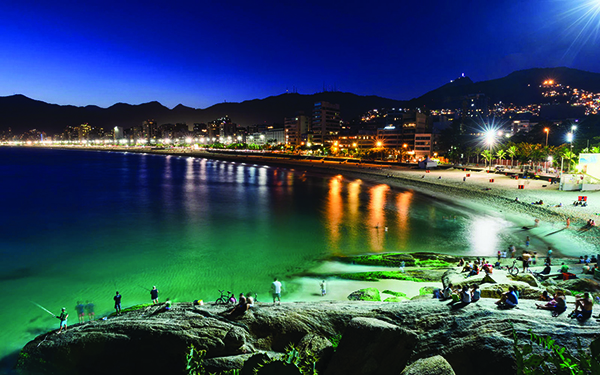The Boys from Ipanema

We strutted defiantly from the Galería Café in the t-shirt/club-dress code of a Brazilian winter out into the well-lit, 3am streets of Ipanema. “We got kicked out of the most trash bar in the city,” M texted me the next day on WhatsApp. One minute, everything was great — boys from Argentina and Mexico, dancing, Smirnoff Ice aplenty, the occasional friendly kiss —
and the next, we were escorted to pay and leave. R, we learned later, had been heckling Jean Wyllys, the second openly gay member of the Brazilian Parliament and a minor Carioca celebrity, badgering him for supporting the Worker’s Party. And Wyllys, apparently, just wanted to drink.
Now, as we turned corners and walked past parked cars, R was tipsily outlining the scandal of Brazilian politics, decrying Lula, Dilma, Wyllys, and other politicians for buying votes, breaking promises, selling out, and generally walking the well-worn path of inaction. I was thrilled! Not just because I was finally making sense of the corruption that people had protested all winter, but because I was also understanding this handsome man’s mix of English and Portuguese, and assumed we were drifting toward his apartment. I felt like I’d arrived.
Weeks before, when I’d asked my Denver friend K why she relocated to Rio de Janeiro, she claimed she was drawn to the feminine quality of the city: “There’s something about the ocean and the rolling hills and the culture that embraces the feminine, especially in contrast to São Paolo’s rigid streets and architecture.” Similarly, on my first day on Ipanema Posto 9 — the queer section of curved beach slightly less famous for drugs than Posto 8 — my friend and host B gestured broadly at the hundreds of nicely filled sungas and muscular torsos: “Can’t you tell that everyone here is a bottom?” I couldn’t, but I felt no shame in appreciating the sights.
Whether or not Rio is essentially feminine or the power-bottom capital, it is one of this hemisphere’s centers for gay men. A 2008 survey of LGBT populations in Brazil’s 10 largest cities estimated — perhaps over generously — that gays represented 19.3 percent of the 6 million Cariocas. Rio is the hub of Brazil’s entertainment industry, and its body culture is unparalleled. Throw in stunning views and beaches, caipirinhas and churrasco, friendliness toward strangers, and multilevel nightclubs like The Week (which attracts more than 1000 men each night), and the queens come yaaaasing.
The Real, Brazil’s currency, had a rough year in 2015, so while an economic recession put pressure on many Brazilians, it’s probably one of the best exchange rates Americans can get. If you decide to travel to Rio, remember that summer here is winter there. Most tourists stay in the Zona Sul, famous for beaches and shopping, but with the Olympics on the western side of the city and an expanded subway system, you can expect new activity and resources in Barra da Tijuca. To get around, you’ll need some basic Portuguese or an extremely cute face, and any work you put into language-learning will pay off in the relationships you’ll make.
You might even get kicked out of a bar.
What's Your Reaction?
Paul Bindel loves food preservation, poetry, and theatre. He lives in and writes from a housing cooperative in Capitol Hill.




